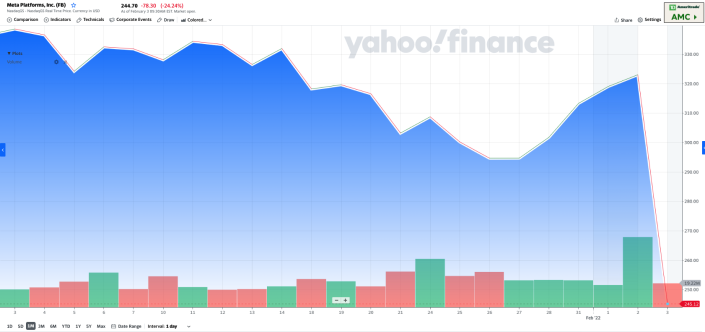Business & Economy
Why Facebook parent Meta’s stock is getting crushed
Facebook parent company Meta (FB) took a shellacking Thursday morning following its Wednesday Q4 earnings results, amid a miss on earnings per share and a dreadful outlook for Q1.
Investors fled the company’s stock Thursday, sending it plummeting more than 25% to a 52-week low of $244.75.
In a statement, CFO David Wehner pointed to Apple’s (AAPL) iOS privacy changes, inflation, and exchange rates as the biggest headwinds for the company moving forward.
But that’s not the only reason for the crash. Deep in Meta’s earnings slides, the company revealed that its user growth has slowed to a little more than a trickle. And in the case of daily active Facebook users in particular, the company actually lost 1 million users.

Meta’s seeming cure for the problem? Investing in the metaverse, where it hopes to become the go-to company for interconnected digital worlds. But that’ll take years to come to fruition, and investors may not wait that long.
Apple’s iOS privacy changes will hurt Meta through 2022
During Meta’s earnings call, both CEO Mark Zuckerberg and COO Sheryl Sandberg pointed to Apple’s App Tracking Transparency feature, introduced in April 2021, as the chief problem facing the company’s ads business.
App Tracking Technology asks users if they want their apps to have the ability to track their activity across the web. Turning the feature off keeps company’s like Meta from being able to learn more about its users, which impacts ad targeting.
Without accurate ad targeting, advertisers will shift away from services like Meta and spend their advertising budgets on other platforms or services.
“Apple created two challenges for advertisers,” Sandberg explained. “One is that the accuracy of our ads targeting decreased, which increases the cost of driving outcomes. The other is that measuring those outcomes became more difficult.”
Wehner laid out the problem in starker terms saying the company will miss out on $10 billion due to iOS’s privacy settings.
“It’s a pretty significant headwind for our business,” he said. “And … we’re seeing that impact … in a number of verticals.”
And it’s not as though there’s any quick turnaround in the cards for Meta. According to Sandberg, efforts to improve Meta’s ad optimization capabilities is a “multi-year effort.”
Meta’s user growth has slowed, and it lost Facebook users
Beyond Apple’s privacy changes, Meta has also seen its user growth slow significantly through the years. But Q4 was the worst for user growth yet.
Facebook added just 2 million monthly active users in the quarter, barely moving the needle from the prior quarter. In Q3, the platform added 15 million monthly active users.
In terms of daily active users, however, Facebook lost 1 million users. That’s a stunning turn of events for a business that has been on a growth spree for the majority of its life.

Meta’s main growth prospects continue to lie with its family of apps, which include Instagram and WhatsApp. Those services added 7 million monthly active users and 5 million daily active users, respectively.
Still, Meta is continuing to monetize users at an increasing clip, with average revenue per Facebook user climbing from $10.14 in Q4 2020 to $11.57 in Q4 2021. In the U.S., the company made $60.57 per user, up from $53.56 in the same quarter the previous year.
Average revenue per Meta family of apps users grew from $7.38 in Q4 2020 to $9.39 in Q4 2021.
Metaverse dreams are still far off, and costly
Zuckerberg is pinning much of his company’s hopes on the metaverse as a means to restore user growth. It’s why he renamed the company Meta and is focusing on releasing new VR and AR headsets.
But the effort will cost the company significant capital. Zuckerberg previously said his metaverse ambitions were set to cost $10 billion in 2021 alone. And that it will be years before the metaverse is anywhere near as advanced as the company envisions it.
For now, though, Meta will need to make the most of the users it has, and continue to work through Apple’s privacy changes.

